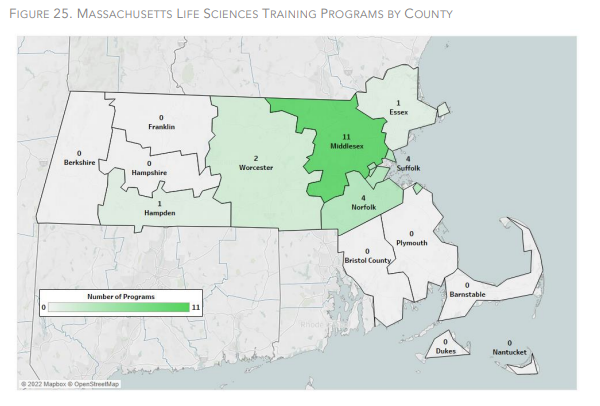As Massachusetts’ life sciences industry continues to expand rapidly, companies must rethink hiring practices to address ongoing workforce challenges, according to a Wednesday report by the Cambridge-based Massachusetts Biotechnology Council.
Worcester County has 20.4% of the state’s biomanufacturing jobs, second after Middlesex County’s 45.2%, according to the MassBio report. Worcester County also has 8.7% of life sciences training programs, largely thanks to Worcester Polytechnic Institute, which is the fourth highest among all the counties. These training programs are vital to the industry, as the main reason behind labor shortages was a lack of industry-specific knowledge and experience, according to MassBio’s report.
In a survey of 129 biopharma companies in the state, MassBio found 78% expect to grow their workforces over the next year, but have experienced difficulty filling open positions.
Life sciences employment has grown 131% in the last 15 years, adding almost 60,500 jobs for a total of 106,600 in Massachusetts. With additional lab and manufacturing space under construction across the state, MassBio is projecting 40,000 more jobs added to the sector by 2024.
More than 94% of businesses surveyed reported some level of hiring difficulty when trying to find qualified candidates for non-entry-level positions, and almost 74% had trouble filling entry-level jobs.
To meet this supply gap, life sciences businesses are willing to hire applicants with less than a bachelor’s degree, with just over half of surveyed firms indicating they would hire someone without a bachelor’s degree for an entry-level position.
MassBio encouraged companies to expand recruitment efforts beyond four-year colleges to community colleges, high school, and vocational schools to spread more awareness about working in life sciences. Growing internship and certification programs within a company can also help increase the industry’s labor supply, the report said.
MassBio commissioned BW Research Partnership, headquartered in Wrentham, to conduct the report.

